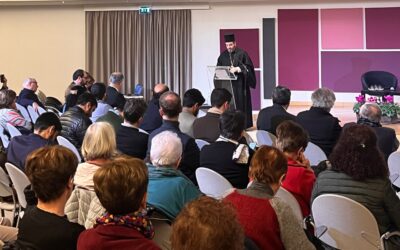“Chiara Lubich has started a silent revolution which I do not hesitate to define as ‘anthropological’, given the personal and social consequences it has brought about.” So said Professor Mark Borg when conferring the honorary degree in Literature and Psychology on Chiara Lubich at the University of Malta. The great hall of the university was filled to capacity and there was also an overflow hall linked by closed circuit TV. Among the audience of 1,500 there were many civic and religious dignitaries including 6 ministers of state, 17 MPs from the two main political parties, the President of the Court, judges, the secretary of the Nationalist Party, the ambassadors of Italy, China and Tunisia, the bishop and the papal nuncio. The island’s press, television and radio were also present. The Citation recognises “the significant contribution made by Chiara Lubich in the field of human thought” for two reasons: “she has translated the nucleus of the Christian message into both a practice and a research method and she has offered to humanistic disciplines, in particular, an original key for interpreting the essence of humanity. She has proposed a model for the spiritual life which respects the individuality of the person and the reciprocity of relationships with a positive valuation of suffering and of all that is negative in both personal and collective history. In this way she has helped cultivate an integral vision of the human person in the field of psychology.” Rector of the University, Professor. Peter Serracino Inglott, defined Chiara Lubich’s teaching as “The way of psychological development towards full humanity”, which for the first time had examined the contribution of the spirituality of unity to psychology. She had traced its origins back to “that first spark which shot out at the height of the war: the discovery of God-Love” and then point by point, she drew out the connections with psychology. For example, having noted that “in psychology it is known that the fundamental need of a person is to be recognised for their own unique and unrepeatable identity,” Chiara Lubich told her experience of the discovery that God loves us: “The discovery and the acquired certainty that God wanted us to exist and loves us, and therefore that we are not an object of pure chance or blind fate, is the basis for that psychological certainty which gives meaning to our life …Only the certainty that God is love, also for you, gives you the strength to continually go out of yourself in order to live and love and create a social communion.” “A great turning point: a psychology open to the Transcendent,” is how 70 professionals from the psychological sciences from various European countries expressed their feelings in a message to Chiara Lubich. And in order to cultivate the growth of the new seeds broadcast in this difficult field of psychological sciences, they held a convention the very next day. There were psychiatrists, psychologists and psychotherapists from various schools of thought (Freudian, Jungian, Adlerian, cognitive-behaviourist, systematic etc). Through sharing their personal reflections on Chiara Lubich’s talk and their own experiences in the field, they could see the seeds of a new psychology. The impression of Herman Schweers, a German psychiatrist and psychotherapist, sums up the mood of the meeting: “I can see here a psycho-anthropological approach which could bear fruit not only in the various schools of psychology, but which could also enrich them, in the sense that they could be fully developed in order to serve the needs of men and women today: to live an interior unity with others, with society and with the Divine which each person carries within themselves.
Love you neighbour – today’s medicine!
Love you neighbour – today’s medicine!




0 Comments